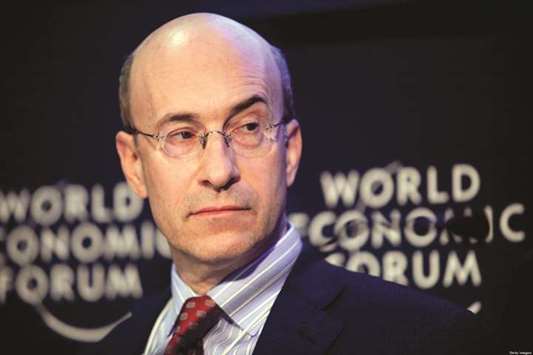Almost a decade after the Lehman crisis, the world’s financial elite in Davos say not to worry about a potential bubble inflating out of record stock prices: this time it’s different.
Leading the charge on the bullish sentiment is the United States, with President Donald Trump boasting regularly about near-daily highs on Wall Street.
He is expected to also celebrate business gains from his historic corporate tax cut when he addresses the World Economic Forum in a speech
tomorrow.
The global economy is finally firing on all cylinders and for bosses gathered in Davos, any risks to the bull market arise more from terrorism or cyber attacks than from the sort of panic that engulfed investment bank Lehman Brothers in September 2008, triggering a worldwide crisis.
“I’m not going to tell you that we’re not going to have another financial crisis, sales of my book would collapse,” said Harvard economics professor Kenneth Rogoff, the author of a book on the crisis called “This Time It’s Different”, which warned of the dangers of complacency.
“But I’m kind of optimistic going forward.. and I actually think we’re at the tail end of the last one (crisis),” he said in Davos.
Still, talk of a bubble is re-emerging as the US stock prices ramp up to historic levels.
Wall Street’s closely watched S&P 500 is up nearly 5% so far this year, and it’s still only January.
US Treasury Secretary Steven Mnuchin, the former Goldman Sachs banker who is leading Trump’s mission to dismantle regulations imposed on Wall Street by Barack Obama’s administration after the crisis, said the strength of the US economy was largely to thank for the markets’ heady rise.
“I saw in the newspaper this morning that people here were talking about asset bubbles,” he told AFP.
“My view is that what you are seeing... is obviously a reflection of the economic programmes we put in play, obviously not just lowering the tax but regulations and the US business cycle,” he said.
But some bank bigwigs said it was precisely the post-crisis wave of regulation that had lessened the risk of a bubble now.
Collaboration between banks and regulators “is at a whole other level than it was pre-crisis”, Barclays chief executive Jes Staley told a Davos panel.
“If you go back to 2005, 2006, the bank would meet with the Fed (Federal Reserve) maybe once every quarter.
Today we have the (regulators) in the bank everyday,” he said. Others pointed at lurking dangers that could reboot a crisis.
“Of course you have some housing bubbles again in some selected markets,” Angel Gurria, the head of the Organisation for Economic Cooperation and Development, told AFP.
But Gurria said the soaring stock markets, especially in the US, were linked to widespread enthusiasm about Trump’s tax cut.
“Imagine the combination. Lower taxes on corporations, repatriation for investment and a big infrastructure programme,” he said.
“That looks and tastes and quacks like a duck; it looks like what you are going to have is growth.”
But this vision of the economy was too “short term”, he said, a view shared by insurance giant Allianz CEO Oliver Baete.
“Underlying growth... has been much better than people predicted.
That’s the good news despite all the political turmoil,” Baete told CNBC in Davos.
“But.. markets are very, very dangerous, and you don’t see that, because valuations are at ever-higher levels, and credit risk looks like it’s disappeared.
Well, it hasn’t disappeared,” he warned.
But to many in Davos, the markets will only fall back to earth due to unforeseen external shocks.
“I worry about geopolitical things that we can’t anticipate, the so-called black swans,” said billionaire David Rubenstein, head of private equity firm Carlyle Group.
“An unanticipated 9/11 type event in the western world, a dirty bomb goes off somewhere, Russia decides to invade someplace...,” he said.
For now, nobody wants to miss out on the markets party, said Blackstone chairman and CEO Steve Schwarzman, another billionaire and backer of Trump.
But he cautioned: “There will come a reckoning at some point.”

Rogoff: I’m kind of optimistic going forward and I actually think we’re at the tail end of the last one (crisis).
